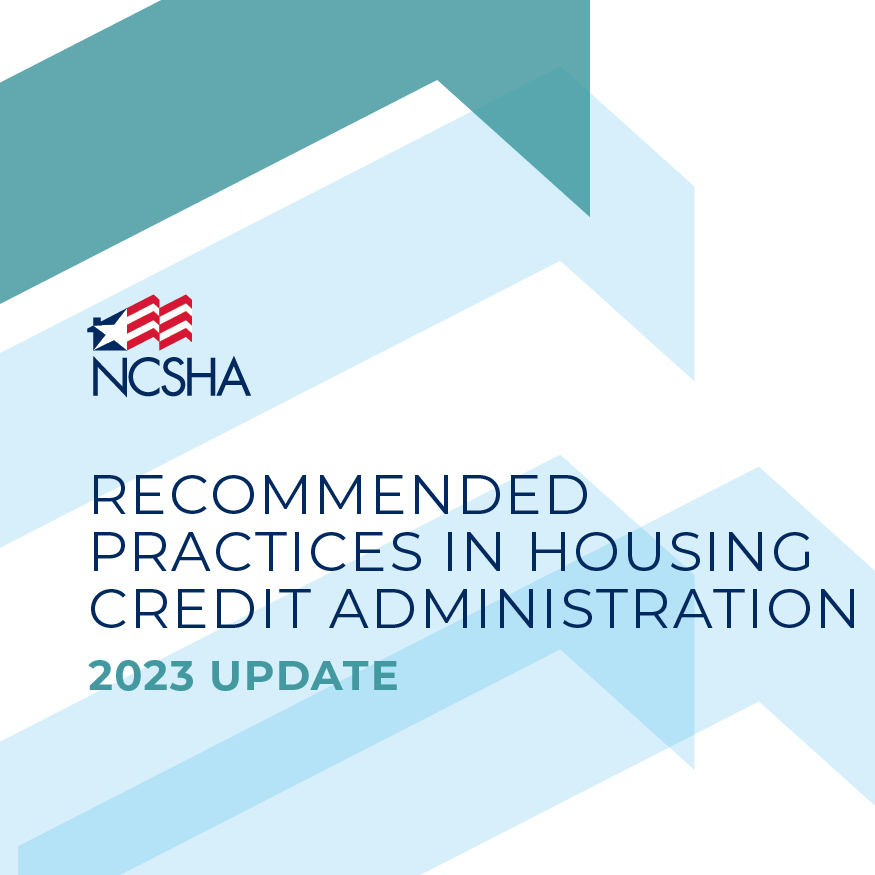NCSHA Recommended Practices in Housing Credit Administration

The National Council of State Housing Agencies represents the state housing agencies that administer the Low Income Housing Tax Credit (Housing Credit) program across the nation. The Housing Credit is one of the most successful and longest-lived federal affordable rental housing production programs ever, responsible for the creation of more than three million homes for America’s low-income families since Congress enacted it in 1986. The Housing Credit produces high-quality, well-designed, financially sound housing where it is most needed for low-income families, including the elderly and persons with special needs.
Read Summary Read Recommended Practices
 Congress entrusted responsibility for administering the Housing Credit to the states, recognizing that each state is better able than the federal government to prioritize and address the low-income housing needs of its residents. This delegation of authority to the states to administer a major federal tax program is unique and unprecedented. In making it, Congress recognized the value of decentralized decision-making concerning each state’s low-income housing needs, while establishing broad standards each state must follow in carrying out their program administration and oversight.
Congress entrusted responsibility for administering the Housing Credit to the states, recognizing that each state is better able than the federal government to prioritize and address the low-income housing needs of its residents. This delegation of authority to the states to administer a major federal tax program is unique and unprecedented. In making it, Congress recognized the value of decentralized decision-making concerning each state’s low-income housing needs, while establishing broad standards each state must follow in carrying out their program administration and oversight.
In the Housing Credit, Congress created a system for producing affordable rental homes that relies on tax incentives and federal oversight by the Internal Revenue Service (IRS), coupled with the market discipline of private-sector developers, syndicators, lenders, and investors. Congress designed the system to provide adequate incentives to the private sector to achieve the objectives Congress intended and heavy tax penalties if it does not.
Congress made the states responsible for allocating Housing Credits, underwriting applications for them, and monitoring developments for compliance with program requirements. States take these responsibilities very seriously. Particularly in this era of more limited federal support for housing assistance, states must strive to assure, to the extent they reasonably can, that housing financed with the Housing Credit remains quality affordable rental property for the full period it is committed to low-income use. All states share an imperative to assure that housing financed by the Credit is prudently underwritten and that compliance with program requirements is maintained throughout the affordability period.
To strengthen Housing Credit administration and continue to merit and maintain congressional confidence in it, states have developed through NCSHA recommended practices in Housing Credit administration. These practices—created by states for states—not only help states meet their responsibilities but also preserve, to the maximum practical extent, the individual state flexibility that is at the heart of the Housing Credit program and its great success.
As Congress expected, during their more than 30 years of Housing Credit administration, the states have evolved a variety of allocation, underwriting, and compliance practices appropriate to meet specific state low-income housing needs and circumstances. At the same time, the states themselves have established recommended practices for each state to consider in its Housing Credit administration.
NCSHA’s recommended practices are voluntary standards in Housing Credit allocation, underwriting, and compliance monitoring that all states should consider adopting regardless of other differences among them.
These standards may be replaced by substantially equivalent standards, which individual states may adopt to achieve particular public policy objectives. To be substantially equivalent, an alternative standard needs to be based on sound underlying economics adequate to provide, under the particular circumstances of the state or development, the same long-term viability the standards recommended in this report are intended to help assure. A fundamental touchstone of state administration of the Housing Credit must be that standards producing unsound real estate cannot serve valid public policy objectives.
Finally, these recommended practices are intended to encourage prudent real estate judgments in every Housing Credit development, regardless of its sponsorship. They do not intrude, however, on the discrete housing policy objectives Congress left to each state to determine. Thus, for example, these recommended practices do not presume to judge the percentage allocation of Housing Credits between larger and smaller developers or between for-profit and nonprofit entities—matters Congress, beyond a 10 percent minimum nonprofit set-aside, left to individual states to decide.
Strong and dynamic state administration is key to the Housing Credit’s success. NCSHA’s Housing Credit recommended practices have allowed states to achieve program excellence while maintaining the flexibility they need to best meet their unique and diverse affordable housing needs.
Updated: October 2023
Download Recommended Practices
Related NCSHA Resources
Housing Credit Advocacy
Updated Regularly | NCSHA Advocacy & Issues
NCSHA Releases New Recommended Practices in Housing Credit Administration
Press Release | October 27, 2023

